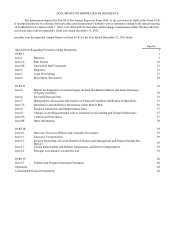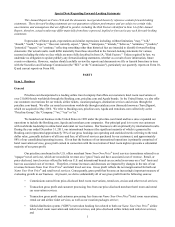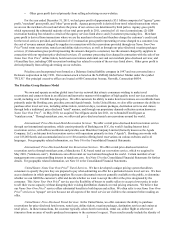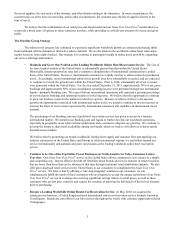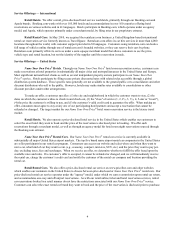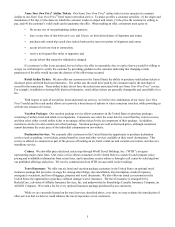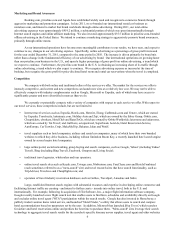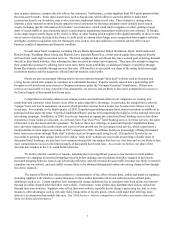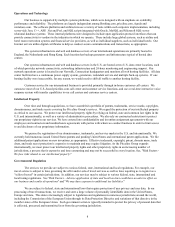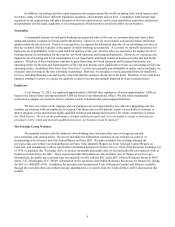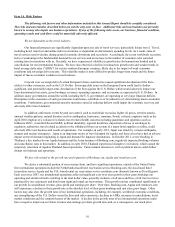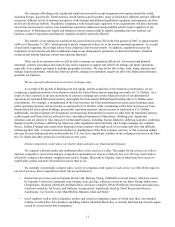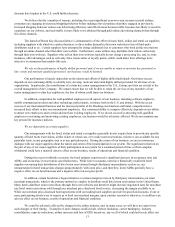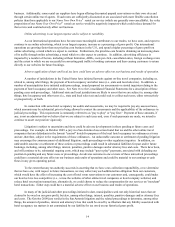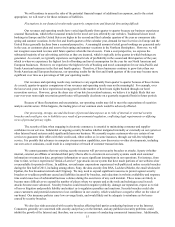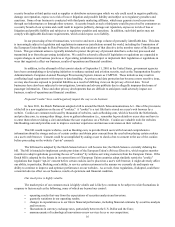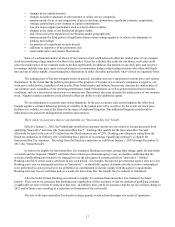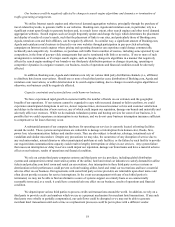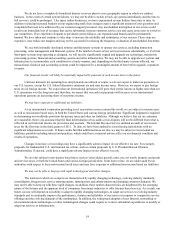Priceline 2011 Annual Report Download - page 11
Download and view the complete annual report
Please find page 11 of the 2011 Priceline annual report below. You can navigate through the pages in the report by either clicking on the pages listed below, or by using the keyword search tool below to find specific information within the annual report.
10
Item 1A. Risk Factors
The following risk factors and other information included in this Annual Report should be carefully considered.
The risks and uncertainties described below are not the only ones we face. Additional risks and uncertainties not presently
known to us may also impair our business operations. If any of the following risks occur, our business, financial condition,
operating results and cash flows could be materially adversely affected.
We are dependent on the travel industry.
Our financial prospects are significantly dependent upon our sale of travel services, particularly leisure travel. Travel,
including hotel, rental car and airline ticket reservations, is dependent on discretionary spending levels. As a result, sales of
travel services tend to decline during general economic downturns and recessions. Accordingly, the recent worldwide recession
led to a weakening in the fundamental demand for our services and an increase in the number of customers who canceled
existing travel reservations with us. Recently, we have experienced volatility in growth rates for transactions booked and in
cancellations for our international business. We have also observed a decline in transaction growth rates and weaker trends in
hotel average daily rates ("ADRs") for certain southern European countries, likely due to the impact of weak economic
conditions and sovereign debt concerns. This volatility makes it more difficult to predict longer-term trends and the future
impact of macro-economic weakness on our business.
Concern over sovereign debt of certain European Union countries has caused significant devaluation of the Euro
relative to other currencies, such as the U.S. Dollar. Sovereign debt issues in the European Union could lead to further
significant, and potentially longer-term, devaluation of the Euro against the U.S. Dollar, which would adversely impact our
Euro-denominated net assets, gross bookings, revenues, operating expenses, and net income as expressed in U.S. Dollars. In
addition, many governments around the world, including the U.S. government, are operating at very large financial deficits.
Disruptions in the economies of such governments could cause, contribute to or be indicative of, deteriorating macro-economic
conditions. Furthermore, governmental austerity measures aimed at reducing deficits could impair the economic recovery and
adversely affect travel demand.
In addition, unforeseen events beyond our control, such as worldwide recession, higher oil prices, terrorist attacks,
unusual weather patterns, natural disasters such as earthquakes, hurricanes, tsunamis, floods, volcanic eruptions (such as the
April 2010 eruption of a volcano in Iceland), travel related health concerns including pandemics and epidemics such as
Influenza H1N1, avian bird flu and SARS, political instability, regional hostilities, imposition of taxes or surcharges by
regulatory authorities, travel related accidents or the withdrawal from our system of a major hotel supplier or airline, could
adversely affect our business and results of operations. For example, in early 2011, Japan was struck by a major earthquake,
tsunami and nuclear emergency. Japan is an important source of travel demand for Agoda, and these crises have had an adverse
impact on travel demand originating in Japan and demand for Japanese destinations. In October 2011, severe flooding in
Thailand, a key market for our Agoda business and the Asian business of Booking.com, negatively impacted booking volumes
and cancellation rates in this market. In addition, in early 2010, Thailand experienced disruptive civil unrest, which caused the
temporary relocation of Agoda's Thailand-based operations. Future natural disasters or civil or political unrest could further
disrupt our business and operations.
We face risk related to the growth rate and expansion of Booking.com, Agoda and rentalcars.com.
We derive a substantial portion of our revenues from, and have significant operations, outside of the United States.
Our international operations include the Netherlands-based hotel reservation service Booking.com, the Asia-based hotel
reservation service Agoda and the U.K.-based rental car reservation service rentalcars.com (formerly known as TravelJigsaw).
Each year since 2007, our international operations achieved significant year-over-year growth in their gross bookings (an
operating and statistical metric referring to the total dollar value, generally inclusive of all taxes and fees, of all travel services
purchased by our customers) and hotel room night and rental car reservations. This growth rate has contributed significantly to
our growth in consolidated revenue, gross profit and earnings per share. Over time, Booking.com, Agoda and rentalcars.com
will experience a decline in their growth rate as the absolute level of their gross bookings and unit sales grow larger. Other
factors may also slow the growth rates of our international operations, including, for example, worldwide economic conditions,
any strengthening of the U.S. Dollar versus the Euro and other currencies, declines in ADRs, increases in cancellations, travel
market conditions and the competitiveness of the market. A decline in the growth rates of our international operations could
have a negative impact on our future revenue and earnings per share growth rates and, as a consequence, our stock price.

